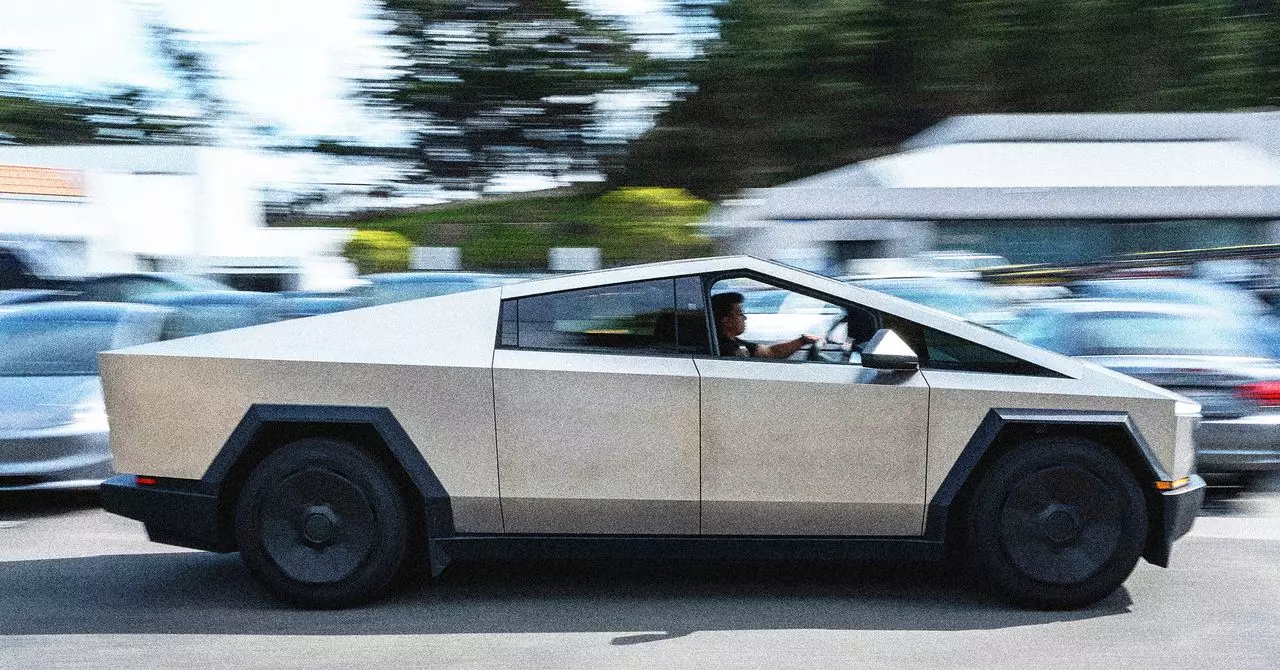In a disconcerting turn of events, Tesla has announced a recall that will impact nearly all units of its highly anticipated Cybertruck, totaling over 46,000 vehicles. This eighth recall within just two years of the electric pickup truck’s market debut centers around the integrity of a stainless steel trim panel, which has been reported to potentially detach while on the road. Unlike many previous Tesla recalls, which could be mitigated through remote software updates, this particular issue necessitates a physical return to Tesla service centers for repairs, marking a significant departure from the company’s usual swift remediation process.
This issue arises not from mechanical malfunction but from a cosmetic component that could ultimately pose safety risks—a concerning juxtaposition given that Tesla is lauded for its innovation and engineering prowess. The adhesive used to secure the trim panel, described by the National Highway Traffic Safety Administration (NHTSA) as vulnerable to separation, raises questions about Tesla’s manufacturing rigor. Such structural assumptions—a basic expectation for car manufacturers—could shake consumer confidence in the brand’s reliability.
Root Causes and Industry Reactions
The catalyst for this recall appears to be linked to environmental factors affecting the adhesive’s effectiveness, especially under cold weather conditions. Dale Harrow, a distinguished figure in automotive design, highlighted the commonality of adhesive use in car construction, typically considered a modern advancement in automotive engineering. He sounded an alarm over this particular incident, calling it “surprising,” especially since major manufacturers like Jaguar, Audi, and Lexus employ similar technologies without documented failures.
The emphasis on weight reduction and aerodynamic efficiency in automotive design doesn’t excuse the apparent oversights that led to the current predicament. While gluing panels is an accepted practice, the unique choice of stainless steel for the Cybertruck raises questions about whether the material’s properties were adequately accounted for in the adhesive bonding process. Harrow’s suspicion that temperature variations during production could be contributing to this adhesion problem is a critical insight that underscores the challenges Tesla faces when innovating within conventional automotive frameworks.
Tesla’s Reputation at Stake
Tesla’s reputation has long been bolstered by its cutting-edge technology and rigorous safety standards. However, this latest recall could tarnish that image, especially when consumer expectation pivots towards not just revolutionary electric cars but also impeccable reliability. As a brand often associated with luxury and forward-thinking design, the surfacing concerns about adhesive failure could resonate negatively with consumers, potentially fuelling skepticism about Tesla’s quality control. With toymakers wary of releasing a product that struggles with consistency and resilience, the luxury automaker must rectify public perception and actual performance.
Compounding the situation is the unique spatial and mechanical environment that the Cybertruck operates within, given its unconventional design and materials. This experiment with novel engineering is commendable but might also indicate a gap between creative ambition and executable manufacturing processes. Tesla, which thrives on disruption, must balance innovation with reliability or risk losing the trust that has been hard-earned over the years.
The Road Ahead
As Tesla takes steps to rectify the adhesive issues affecting the Cybertruck, the broader implications for its manufacturing strategy are noteworthy. This recall may compel the company to re-evaluate its approach to combining novel materials with existing automotive technologies. Perhaps it will become a lesson in moderation in experimental resilience—prioritizing dependable performance over purely aesthetic advancement.
With an eye on future developments, the company’s swift adaptation to consumer and regulatory feedback will be crucial. As Tesla navigates these turbulent waters, it needs to reaffirm its commitment to quality. How Timberline recovers from this recall will set a precedent for handling similar instances and could serve as a blueprint for others in the industry grappling with innovation and reliability in their manufacturing processes. As the electric vehicle market grows increasingly crowded with competitors, the pressure mounts on Tesla to demonstrate that it can not only innovate but also keep safety and durability at the forefront of its operational ethos.

